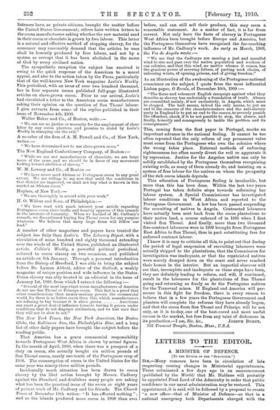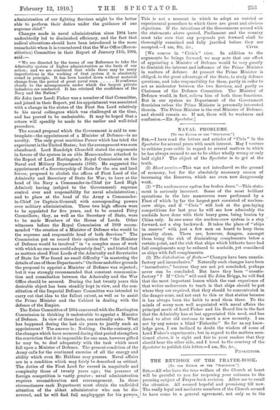LETTERS TO THE EDITOR.
A MINISTER OF DEFENCE.
[To THE EDITOR OF THE " SPECTATOR."] Sin,—Many rumours have been in circulation of late respecting coming changes in Ministerial appointments, These culminated a few days ago in an announcement (published by the World) that Mr. Haldane will probably be appointed First Lord of the Admiralty in order that public confidence in our naval administration may be restored. This appointment, it is said, will be followed by a proposal to create " a new office—that of Minister of Defence—so that in a national emergency both Departments charged with the
administration of our fighting Services might be the better able to perform their duties under the guidance of one supreme chief."
Changes made in naval administration since 1904 have undoubtedly led to diminished efficiency, and the fact that radical alterations should have been introduced is the more remarkable when it is remembered that the War Office (Recon- stitution) Committee in their Report of January 11th, 1904, said:—
" We are directed by the terms of our Reference to take the Admiralty system of higher administration as the basis of our action ; and we are convinced that while there may be many imperfections in the working of that system it is absolutely sound in principle. It has been handed down a ithout material
change from the period of great naval wars It conforms closely to the arrangements under which the largest private industries are conducted. It has retained the confidence of the Navy and the Nation."
Sir John (now Lord) Fisher was a member of that Committee, and joined in their Report, yet his appointment was associated with a change in the status of the First Sea Lord relatively to his naval colleagues which was challenged at the time, and has proved to be undesirable. It may be hoped that a return will speedily be made to the earlier and well-tried procedure.
The second proposal which the Government is said to con- template—the appointment of a Minister of Defence—is no novelty. The only great maritime Power which has tried the experiment is the United States ; but the arrangement was soon abandoned. Lord Randolph Churchill stated the arguments in favour of the system in an able Memorandum attached to the Report of Lord Hartington's Royal Commission on the Naval and Military Departments (1889). He suggested the appointment of a Secretaryship of State for the sea and land forces; proposed to abolish the offices of First Lord of the Admiralty and Secretary of State for War; to have at the head of the Navy a Commander-in-Chief (or Lord High Admiral) having (subject to the Government) supreme control over and responsibility for naval administration ; and to place at the bead of the Army a Commander- in-Chief (or Captain-General) with corresponding powers over military administration. These two high officers were to be appointed for five years, and to be created Privy Councillors ; they, as well as the Secretary of State, were to be made Members of the House of Lords. Other witnesses before the Royal Commission of 1889 recom- mended "the creation of a Minister of Defence who would be the supreme and responsible head of both Services." The Commission put on record their opinion that " the Minister of Defence would be involved" in "a complex mass of work with which no one man could adequately deal"; and hinted that as matters stood First Lords of the Admiralty and Secretaries of State for War found no small difficulty " in mastering the details of one of these Departments." On these and other grounds the proposal to appoint a Minister of Defence was rejected ; but it was strongly recommended that constant communica- tion and consultation between the Admiralty and the War Office should be secured. During the last twenty years this desirable object has been steadily kept in view, and the con- stitution of the Imperial Defence Committee was intended to carry out that idea to the fullest extent, as well as to assist the Prime Minister and the Cabinet in dealing with the defence of the Empire.
The Esher Committee of 1904 concurred with the Hartington Commission in thinking it undesirable to appoint a Minister of Defence. In view of these facts, one naturally asks : What has happened during the last six years to justify such an appointment ? The answer is : Nothing. On the contrary, all
the changes which have occurred during that period strengthen the conviction that it is impossible for one man, however gifted he may be, to deal adequately with the task which must fall upon a Minister of Defence. The present condition of the Army calls for the continued exercise of all the energy and ability which even Mr. Haldane may possess. Naval affairs are in a condition which may fairly be described as critical. The duties of the First Lord far exceed in magnitude and complexity those of twenty years ago ; the pressure of foreign competition is vastly greater ; naval administration requires reconsideration and rearrangement. In these circumstances each Department must obtain the undivided attention of the ablest administrator who can be dis- covered, and he will find full employment for his powers. This is not a moment in which to adopt an untried or experimental procedure to which there are great and obvious objections. If the intentions of the Government accord with the statements above quoted, Parliament and the country must take care that any proposals put forward shall be thoroughly examined and fully justified before they are [We concur in " Civis's " view. In addition to the arguments he brings forward, we may note that one effect of appointing a Minister of Defence would be very greatly to diminish the interest and influence of the Prime Minister in matters of defence. At present the Prime Minister is obliged, to the great advantage of the State, to study defence questions, and take responsibility for them, partly in order to act as moderator between the two Services, and partly as Chairman of the Defence Committee. The Minister of Defence would, in fact, relieve him of both these functions. But in our system no Department of the Government flourishes unless the Prime Minister is personally interested therein. The Prime Minister is the real Minister of Defence, and should remain so. If not, there will be weakness and confusion.—En. Spectator.]











































 Previous page
Previous page